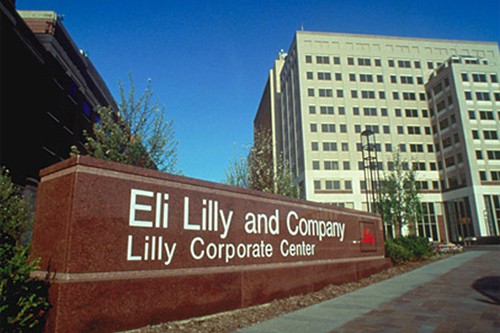
Eli Lilly has agreed to become a partner in an amyloid-targeting drug developed by AstraZeneca, shortly after conceding defeat on its solanezumab drug for Alzheimer’s disease.
Lilly and AZ will collaborate on the development of MEDI1814, an antibody against amyloid-beta 42 (Aβ42), which is currently in phase I trials. The formation of amyloid beta plaques is a key feature of Alzheimer’s and the Aβ42 form is ‘particularly associated with the disease’, according to AZ.
The announcement comes as Lilly presented detailed results of its EXPEDITION 3 trial of solanezumab at the Clinical Trials on Alzheimer’s Disease (CTAD) meeting in San Diego, confirming its earlier announcement that the drug had joined many other amyloid-targeting drugs in failing to meet its clinical objectives.
MEDI1814 dose-dependently reduces levels of the Aβ42 peptide – which is thought to be particularly neurotoxic – and so potentially could slow the progression of Alzheimer’s, they suggest.
Last year, researchers at the University of Illinois at Chicago (UIC) carried out a study of the structure of Aβ peptides and concluded that Aβ42 has unique differences, so drugs targeting other forms of the peptide may not work well against this variant.
The two companies are already working together on AZD3293, a BACE inhibitor which is designed to interrupt the formation of Aβ at an early stage in the process, and are running two pivotal phase III trials on the drug.
The decision reveals that Lilly is doggedly determined to pursue its amyloid research track for Alzheimers, despite investing considerable sums in the solanezumab programme and other failed candidates such as gamma secretase inhibitor semagacestat.
“We recognise the significant burden Alzheimer’s disease places on patients, caregivers and our society and we remain committed to finding ways to change the course of the disease,” asserted president of Lilly Research Laboratories Jan Lundberg.
Other data presented at the CTAD meeting suggests that continuing to go after amyloid as a target may still bear fruit. A trial of Biogen’s anti-amyloid antibody aducanumab showed it was effective at stripping out Aβ in the central nervous system, while titrating the aducanumab dose carefully seemed to avoid the problems of brain swelling seen in earlier studies.
Aducanumab acts differently than solanezumab, which was designed to mop up the peptide in the blood rather than attack amyloid plaques in the brain directly. Biogen is hoping that its approach – which is being tested with very early stage (prodromal) Alzheimer’s patients – will succeed where Lilly’s drug failed, and it has two phase III trials ongoing to try to demonstrate that.




